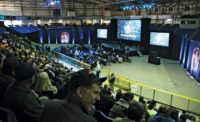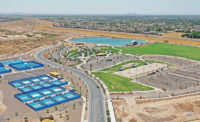The founders of Sunnyvale-based Level 10 Construction set some rather ambitious goals for their new company when it debuted in September 2011. Though the Bay Area’s post-recession construction boom was only just finding momentum, a revenue target of $500 million within the first five years seemed achievable to the firm. Another objective was to make an immediate impression on prospective clients by establishing an across-the-board reputation for consistent performance at the upper end of the conceptual “1 to 10” rating scale—the inspiration for the firm’s name.
Not yet four years old, Level 10 has done all that, and more.
Having eclipsed its original revenue target by nearly $123 million last year, Level 10 says it is on track to reach $750 million in 2015, thanks in part to high-profile projects such as the $540-million, 802-ft-tall 181 Fremont residential and office tower in San Francisco; the $578-million Moffett Place mixed-use campus in Sunnyvale; and the $435-million Frank Gehry-designed Facebook West Campus in Menlo Park.
Level 10’s two-year-old San Diego office has likewise quickly established itself in Southern California’s higher education and biotechnology sectors, with renovation projects at the University of San Diego, plus the recent award of two laboratory and R&D facilities that will support research into drugs and technologies for fighting cancer and other diseases.
But Level 10’s accelerated ascent is hardly beginner’s luck: Its leadership team is made up of alumni from longtime West Coast contractor Rudolph & Sletten.
“We had done these things in other companies and were accustomed to high demand,” says Jim Evans, chief financial officer. Evans characterizes Level 10 as more of a spin-off than a typical start-up. “It was easy to get going quickly.”
Dennis Giles, the firm’s president, adds that the founders’ respective industry reputations aided in quickly forging relationships among subcontractors and prospective clients.
“We received a lot of inquiries from people asking if we were looking for help,” Giles says, adding that Level 10’s staff now totals more than 500, more than half of which are in craft positions.
At the same time, Level 10 afforded its founders the opportunity to structure the new firm around success factors gleaned from their collective experience, such as self-performing concrete and foundation work. The team also emphasizes employee satisfaction and development.
“We’re a very flat organization, with no constraints on how we do business,” says Bob Maxwell, senior vice president of business development. He also heads Level 10’s San Diego office. “It’s sometimes difficult to introduce change in long-established organizations. For us, if someone has a better way, let’s see what it takes to implement it. We’re open to new ideas.”












Post a comment to this article
Report Abusive Comment